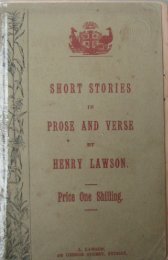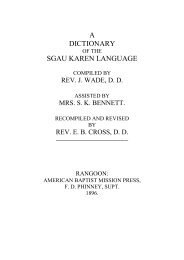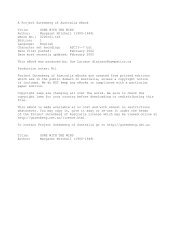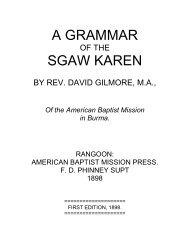A Manual of the Pwo Karen Dialect Author: Charles Harry Duffin * A ...
A Manual of the Pwo Karen Dialect Author: Charles Harry Duffin * A ...
A Manual of the Pwo Karen Dialect Author: Charles Harry Duffin * A ...
You also want an ePaper? Increase the reach of your titles
YUMPU automatically turns print PDFs into web optimized ePapers that Google loves.
A Shan ၦၡၩၥဲၫ့ကဂၩ<br />
A bald-headed man ၦချၩခိၪကဂၩ<br />
An old man ၦခွၫၡါကဂၩ<br />
An old woman ၦမု ၪၡါကဂၩ<br />
An opium eater ၦဖံ းဆါကဂၩ<br />
An European ၦခိၪလၩဘွၩကဂၩ<br />
A Shepherd ၦယိၥိၪကဂၩ<br />
IDIOMS<br />
1. In some instances <strong>the</strong> noun is repeated in place <strong>of</strong> <strong>the</strong> numeral affix, whe<strong>the</strong>r <strong>the</strong>re be a proper numeral affix<br />
or not.<br />
One compound ဝးကဝး<br />
One piece ကဲၩ့ကကဲၩ့<br />
One country ခးကခး<br />
One granary ဖၫ့ကဖၫ့<br />
One city ဝံးကဝံး<br />
One name မံ ၩ့ကမံ ၩ့<br />
One village တဝၫ့ကတဝၫ့<br />
One shell ကူၩကကူၩ<br />
2. The general rule <strong>of</strong> numeral affixes following <strong>the</strong> numeral to which <strong>the</strong>y relate is not followed in cases where<br />
<strong>the</strong> numeral is ten or a multiple <strong>of</strong> ten; in such instances <strong>the</strong> affix precedes <strong>the</strong> numeral, which is joined to its<br />
noun by <strong>the</strong> letter အ.<br />
Ten days နံၩအနံၩကဆံ ၫ<br />
Thirty sheep ၥိၪအဒု ၩၥၧၫ့ဆံ ၫ<br />
Forty goats ဘ့ ၪအဒု ၩလံဆံ ၫ<br />
Twenty buffaloes ပနါအဒု ၩနံၫဆံ ၫ<br />
Fifty horses ကၥ့ ၪအဒု ၩယဲဆံ ၫ<br />
Sixty carts လဲၪ့အခိၪဎူၫဆံၫ<br />
3. The ordinal numerals are အခၪ့ထံၭ, _first_, and အထု ၬ, _last_.<br />
The first man ၦၡၩအခၪ့ထံၭကဂၩ<br />
The first horse ကၥ့ ၪအခၪ့ထံၭကဒု ၩ<br />
The first boat ချံၫအခၪ့ထံၭကဖျိၪ့<br />
The first cart လဲၪ့အခၪ့ထံၭကခိၪ<br />
The first boy ဖိၪၥၪခွၫအခၪ့ထံၭကဂၩ<br />
The last day နံၩအထု ၬကနံၩ<br />
The last horse ကၥ့ ၪအထု ၬကဒု ၩ<br />
The last boat ချံၫအထု ၬကဖျိၪ့<br />
The last cart လဲၪ့အထု ၬကခိၪ<br />
The last boy ဖိၪၥၪခွၫအထု ၬကဂၩ<br />
4. The passive voice <strong>of</strong> <strong>the</strong> verb is formed by placing ဘၪbetween <strong>the</strong> personal pronoun and <strong>the</strong> verb, which<br />
latter is followed by <strong>the</strong> personal pronoun in <strong>the</strong> objective case.<br />
I am beaten. ယဘၪဆၧဒိၪယၧၩလီၫ.<br />
We are beaten. ပဘၪဆၧဒိၪပၧၩလီၫ.<br />
You are beaten. နဘၪဆၧဒိၪနၧၩလီၫ.<br />
You are beaten. နၥံ ၪဘၪဆၧဒိၪနၥံ ၪလီၫ.







